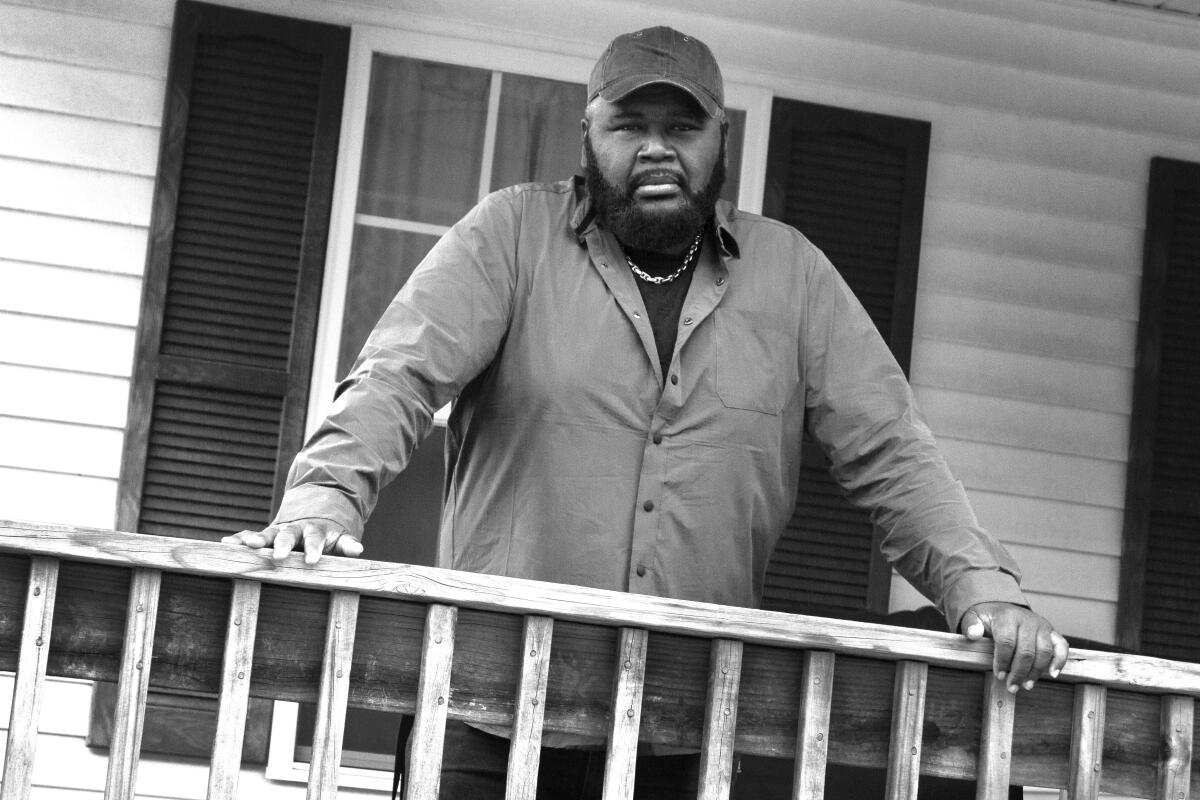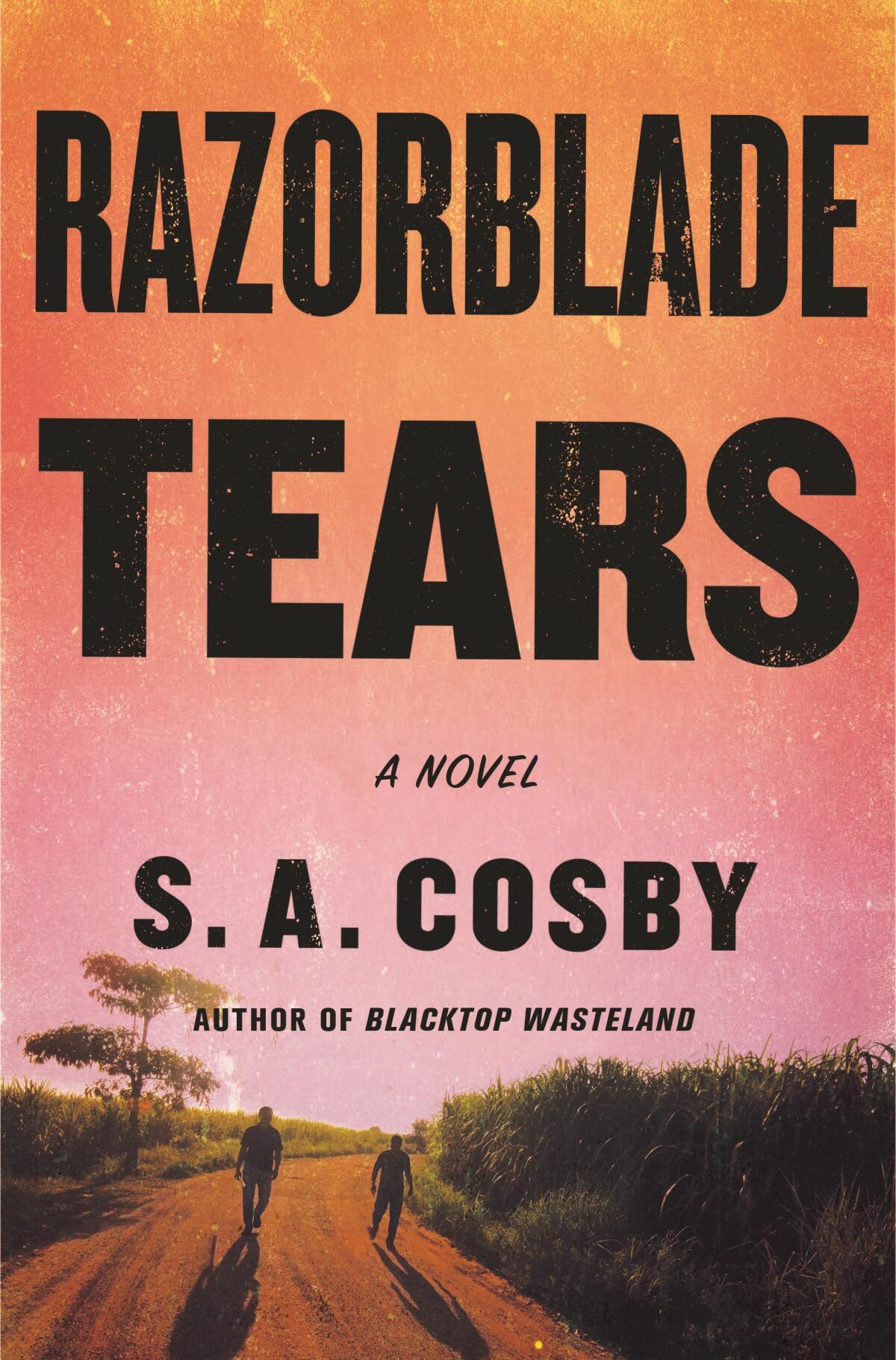Review: Southern mystery star S.A. Cosby blows up the odd-couple revenge thriller

On the Shelf
Razorblade Tears
By S.A. Cosby
If you buy books linked on our site, The Times may earn a commission from Bookshop.org, whose fees support independent bookstores.
Last year, S.A. Cosby’s “Blacktop Wasteland” came screaming across the literary landscape, shredding readers’ expectations about Southern life, race and crime. A rubber-burning tale of Black and white criminals uniting to defeat a common foe, the novel was also a deep rumination on fathers and the impact of their absence. Cosby’s original voice, action-packed scenes and unflinching examination of relationships earned him praise from a wide array of peers and critics, as well as the 2020 Los Angeles Times Book Prize for mystery/thriller.
Cosby’s drive to expand the chorus of voices representing the South is on full display in his follow-up, “Razorblade Tears.” The novel’s DNA — a Black man and a white man unite to fight a common foe — may seem familiar to readers of “Blacktop Wasteland” or Joe R. Lansdale’s Hap and Leonard series, but its composition feels utterly unique, as if the elements of one’s waking life were scrambled in a dream.
Ike Randolph is an ex-gang member who, some 15 years after his release from prison, has his life back on track — reunited with his wife and running a thriving landscaping business. Ex-con Buddy Lee Jenkins is a divorced, good-natured racist, drinking his life away in a trailer with a growing collection of empty beer cans and a suspicious cough. These men live mere miles apart but were incarcerated in different prisons at different times; in racially segregated Virginia there would be no reason for their paths to cross — except that each is the father of a gay son.
Or rather, was. In the opening chapters, we learn that Ike’s and Buddy Lee’s sons, Isiah Randolph and Derek Jenkins, met in college, married and had a daughter before they were brutally murdered. Exiled from their children’s lives because of their homophobia, the grieving in-laws don’t meet until the funeral. The scenes that follow convey their angry regret over missed opportunities to forge adult relationships with their children. Buddy Lee lashes out at a homophobic landlord; Ike nurses a rum on the rocks and the fantasy that there is still time to reconcile with Isiah, to bridge the chasm each had to cross to accept the truth.
“But time was a river made of quicksilver,” Ike acknowledges. “It slipped through his grasp even as it enveloped him. Twenty became forty. Winter became spring, and before he knew it he was an old man burying his son and wondering where in the hell that river had taken him.” The novel takes its name from the lacerating tears Ike sheds over what can never be.
S.A. Cosby’s “Blacktop Wasteland” stakes out territory in undersung places — and sings too of the complex lives of Black men.
Yet the story won’t stay mired in grief, as Cosby signals in his epigraph, from Shakespeare’s “Henry VIII”: “My drops of tears I’ll turn to sparks of fire.” Its import comes into focus after the funeral, when detectives inform Ike that the criminal investigation has stalled out in the face of stonewalling by Isiah and Derek’s mistrustful friends. After their gravesites are desecrated, the fathers are spurred to set aside their suspicions and prejudices in an all-consuming quest for answers and revenge.
But old habits die hard, racism perhaps even harder. Cosby wisely tweaks the formula, mixing in biting humor and frank confrontations about race and sexuality amid the mayhem — and making “Razorblade Tears” a more emotionally raw affair than “Blacktop Wasteland,” which balanced its violence with some nifty car chases. While the automobiles of choice here are pickup trucks of various vintages, it’s rage that drives these characters in their statewide hunt for clues to their sons’ murders.
Along the way, various Virginia subcultures flash across the landscape. Some of the terrain will be familiar to crime fiction readers — racist good ol’ boy biker clubs and their Black gangster counterparts are both here, strange bedfellows in crime as the fathers are in crime-fighting. And then there’s Buddy Lee’s ex-wife, Christine, who remarried and hasn’t looked back — until now.

As interesting as these characters may be, where Cosby excels is in revealing a broader picture of the New South. There are hard leftists like the Blue Anarchists, whom Isiah covered as a reporter for the nonprofit Rainbow Review, as well as a queer-friendly bakery/catering company where Derek had just received a promotion. Because these fathers were so alienated from their sons’ lives, their mission provides readers with access to queer spaces through the eyes of the uninitiated, as well as insight into how they function in small towns south of the Mason-Dixon Line. Cosby presents them without judgment or artifice, placing the fathers’ prejudices, hang-ups and deep-seated rage in stark relief.
Times Book Prize finalists Rachel Howzell Hall, Ivy Pochoda, S.A. Crosby, Jennifer Hillier and Christopher Bollen talk about race, place and genre.
At the Rainbow Review, Ike and Buddy Lee learn Isiah had received death threats for his reporting on the Blue Anarchists. “It’s a dangerous time to be a journalist,” Isiah’s editor tells Ike. Did the group carry through on their threats or were the murders connected to Tangerine, a woman Derek met on a catering gig who was having an affair with a prominent married man? Tangerine had arranged to spill the tea on her lover to Isiah, then changed her mind just days before the couple’s murder.
The duo follows the lead on Tangerine to Garland’s bar in Richmond, setting up a comic moment as these macho Southern men realize they’re in a gay club. But the atmosphere turns dangerous when one of the men misinterprets Ike’s presence at the bar and a fight ensues.
Over the short time span of “Razorblade Tears,” Ike and Buddy Lee get into a lot of fights, leaving a growing body count in their rearview mirror and the cops, perhaps implausibly, a few steps behind. Cosby has an unnerving ability to describe what fists, knives, guns and assorted garden implements can do to the human body, which may make the violence more vivid than some readers can abide. Riding shotgun with the violence, though, is also great beauty — in descriptions of the grief of a community, in the fathers’ stirring awareness of the true meaning of love and even in Cosby’s reverence for the vibrant natural world (a sunset “dipping lower than a ballroom dancer”).
The contradictions in “Razorblade Tears” suggest the deeper moral ambiguity in this and all vigilante narratives. Unlike another Shakespearean character, who famously said revenge is a dish best served cold, these Southern fathers are well aware of the paradoxes of their mission, even as they are compelled to finish it in the name of justice for their boys. “Folks like to talk about revenge like it’s a righteous thing,“ Ike says, “but it’s just hate in a nicer suit.”
Favorite books of S.A. Cosby, author of “Blacktop Wasteland,” feature richly developed characters and reflect how Black lives are affected by systemic racism.
Woods is a book critic, editor and author of the Charlotte Justice series of crime novels.
More to Read
Sign up for our Book Club newsletter
Get the latest news, events and more from the Los Angeles Times Book Club, and help us get L.A. reading and talking.
You may occasionally receive promotional content from the Los Angeles Times.






